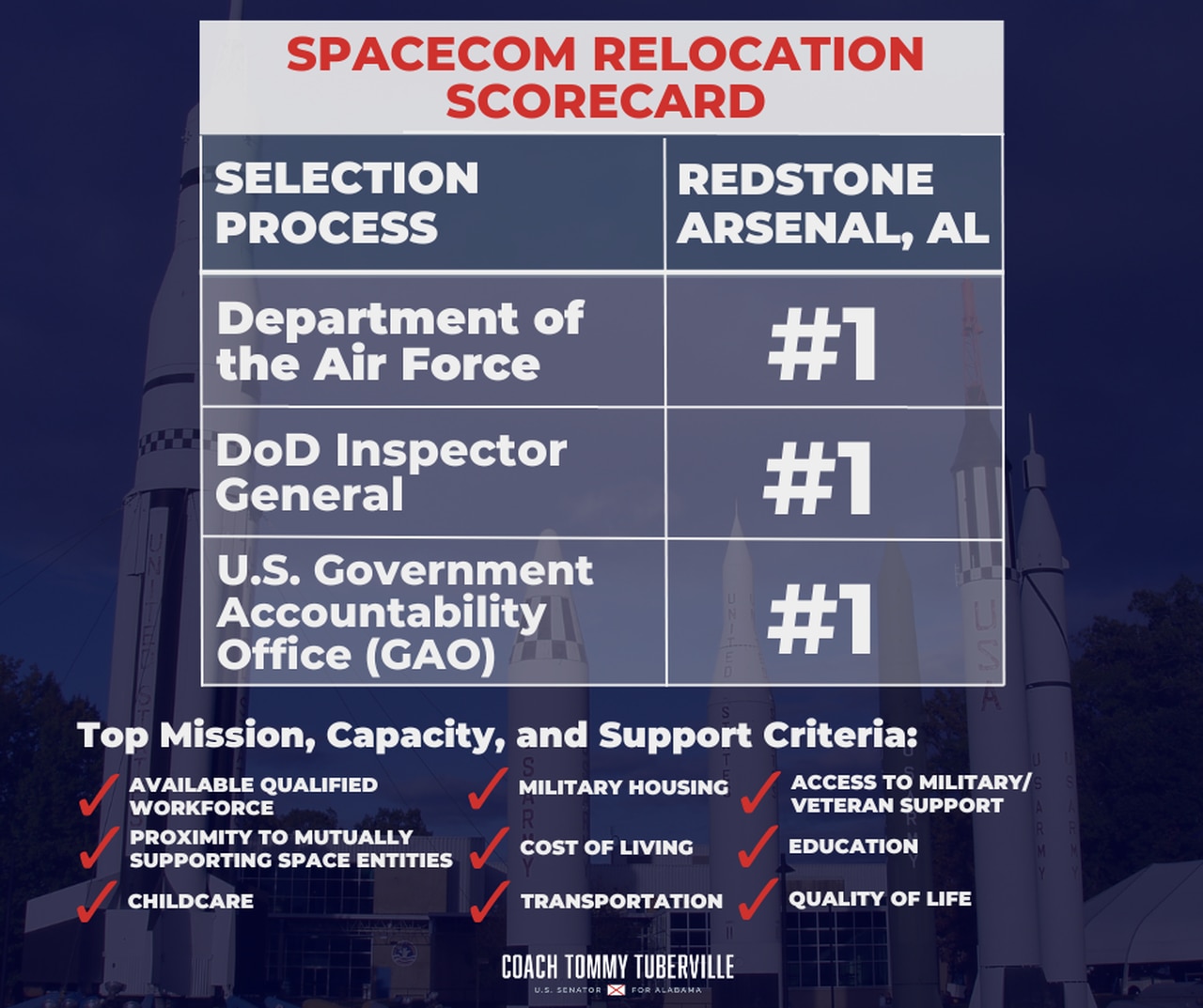By Lee Roop
Alabama’s strict abortion ban is being raised by Colorado again as an argument against moving Space Command headquarters to Huntsville and also “the latest front in the culture war over abortion,” according to a Washington political news website.
U.S. Sen. Michael Bennet (D-Colo.) made what the political website Politico this week called a “last-ditch bid to stop U.S. Space Command from moving to Alabama (that) is anything but typical.” Bennet argues that access to reproductive care, specifically abortions, is a right of female service members now threatened by the possibility of being stationed at a command headquarters in Alabama.
Alabama has “some of the strictest laws in the nation surrounding abortion,” according to the website womenscaremedicalcenter.org. The state bans all abortions after the point of conception – the fertilization of an egg – and it has no exceptions for rape or incest.
Huntsville came out on top in a site comparison among competing headquarters sites including Colorado where the headquarters was first activated. Supporters of the command move to Alabama such as U.S. Sen. Tommy Tuberville (R-Ala) responded to those allegations today.
“Political attempts to derail SPACECOM’s move to Alabama are nothing but a case of sore loser syndrome,” Tuberville told AL.com today. “Those standing in the way are relying on red herring arguments instead of the facts. Check the scorecard: Huntsville is the #1 spot for @US_SpaceCommand.”
Supporters of the move say the number of abortions by serving military members is in the single digits per year. They also point to an Oct. 20, 2022 statement by Secretary of Defense Lloyd Austin III supporting service members’ access to health care providers outside the states where they are based if necessary.
Austin said the Pentagon would, “Establish travel and transportation allowances for Service members and their dependents, as appropriate and consistent with applicable federal law and operational requirements, and as necessary amend any applicable travel regulations, to facilitate official travel to access non-covered reproductive health care that is unavailable within the local area of a Service member’s permanent duty station.”
Austin issued his memorandum after the Supreme Court ruled in June 2022 that the Constitution “does not confer a right to abortion” and overturned previous cases upholding that right. Ruling in the case of Dobbs v. Jackson Women’s Health Organization, the court returned issues of abortion to the states and Alabama banned abortion shortly afterward.
“Political attempts to derail SPACECOM’s move to Alabama are nothing but a case of sore loser syndrome,” Tuberville said today. “Those standing in the way are relying on red herring arguments instead of the facts. Check the scorecard: Huntsville is the #1 spot for @US_SpaceCommand.”
Tuberville released his own “scorecard” showing the site selection areas where the Huntsville site came in first and released supporting data.

The fight over the Space Command headquarters started in 2019 when the Pentagon identified six suitable locations for the command’s permanent home. The command was started and is now located in Colorado Springs, Colorado. The Pentagon ultimately allowed communities to “self-nominate” to host the headquarters and 66 communities from 26 states responded.
After a lengthy and detailed review, the Air Force said in January 2021 that it had visited the six finalists to compare “factors related to mission, infrastructure capacity, community support and costs” and “Huntsville compared favorably across more of these factors than any other community.” The finalist bases were in Alabama, Colorado, Florida, Nebraska, New Mexico and Texas.
A General Accounting Office (GAO) review of the decision said the Air Force selection process “identified Redstone Arsenal as the highest scoring location in the Evaluation Phase, the highest ranked location in the Selection Phase and the location with the most advantages in the decision matrix.”
In August 2021, however, former President Trump claimed during a radio interview on Alabama’s “Rick & Bubba” show that he “single-handedly” made the decision to favor Alabama. Colorado has pointed to that interview since as evidence of presidential interference.
“Once we changed administrations in the White House, the Colorado delegation continued to say it was political,” Tuberville said in his weekly press briefing this week. “It was not political. It was done for the right reasons. There have been three more studies since President Biden took office. Huntsville has come out on top of all three of those studies.”
In a statement his staff refers reporters to now, Bennet said in January that investigations over the last two years “revealed that senior military leaders identified Peterson Space Force Base as their top choice for Space Command’s headquarters because it will reach Full Operational Capability faster than any other location, cost less, and minimize attrition and disruption to the mission – all of which are critical to our national security. Instead, President Trump put politics first with his abrupt decision to send U.S. Space Command to Alabama.
“In the face of Putin’s invasion of Ukraine and China’s saber rattling in the Pacific, national security cannot just be one of many criteria. It has to be the central priority.” That means leaving it in Colorado, Austin said.











